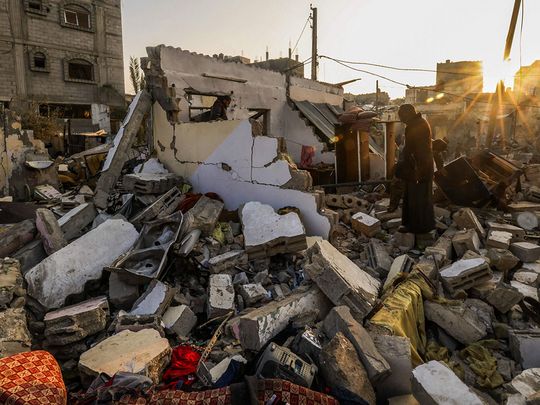
Numerous media outlets have reported on an Egyptian initiative presented to Hamas, designed to pave the way towards peace and the eventual establishment of a Palestinian state. This proposal, aimed at saving lives, suggests that Hamas relinquishes control of the Gaza Strip.
It includes steps such as a ceasefire, the release of Palestinian detainees in Israeli prisons, and those held by Hamas and other factions. This would lead to a transitional phase, ultimately culminating in the realisation of the two-state solution.
Egypt’s role in this proposal is deeply rooted in its historical experience. The country has endured significant sacrifices in its conflicts with Israel, impacting its future and developmental plans.
Economic analysts suggest that Egypt’s current economic challenges are partly the consequences of these prolonged wars, specifically referencing the aftermath of the 1967 war. In recent years, Egypt has served as a haven for people from various Arab nations experiencing turmoil, including Syria, Sudan, Libya, and Yemen.
Read more by Prof Mohammad Alrumaihi
The proposal, born out of a deep understanding and foresight regarding the challenges currently facing Palestinians, reflects Egypt’s extensive experience and knowledge in regional affairs. This initiative also considers the significant and ongoing international dynamics, particularly the steadfast support for Israel from Western nations.
Before delving into the subsequent developments, it’s essential to recognise that the events of Oct. 7 represented a moment unlike any other in terms of its form, speed, and outcomes. For Israel, it was an ‘unpleasant surprise’ that challenged its security measures, exposed the limitations of its intelligence and technology, and demonstrated the power of non-technical approaches.
Displacement of Gazans
While these facts are undeniable, the Israeli response to these events has been both destructive and, to some extent, anticipated. This response, unprecedented in its magnitude and timing in modern history, could be characterised as genocide, leading to potential displacement of the Gazans.
The nature of Israel’s reaction is not arbitrary but calculated. Some may interpret it as a manifestation of anger, yet it also represents a strategic opportunity seized by the Israeli right. This stance is bolstered by supportive internal public opinion. At this juncture, it becomes imperative to pause and engage in rational, critical thinking about the situation.
The ongoing atrocities in Gaza deeply affect Arabs and all who value humanity. Despite repeated attempts by Arab countries and other sympathetic nations in the Security Council to pass a “ceasefire” resolution, they have been unsuccessful. Even the most recent and modest resolution did not face direct opposition from the United States, but it abstained from voting, citing the lack of condemnation of Hamas.
The situation presents a dire choice: the continued loss of civilian lives in Gaza or the pursuit of a political solution that salvages what remains possible. No rational person desires the former, but the trajectory of the Israeli machinery, driven by psychological, historical, political, and strategic reasons of its senior politicians, seems set on a course that could lead to a mass “transfer” of populations.
This potential transfer from Gaza and later the West Bank to neighbouring areas could be the largest in the region’s history, surpassing the Nakba of 1948 and subsequent wars. Such a scenario would impose unbearable burdens on neighbouring countries, potentially leading to severe and prolonged internal conflicts.
A zero-sum equation
The situation represents a critical and harrowing confrontation, one in which mere slogans, wishes, or illusions offer no solution. The stakes are high, and the outcomes could be historically significant, reshaping the region in profound ways.
The concept of a zero-sum equation in geopolitics, where one party’s gain is another’s loss, is not novel in world history. This dynamic is often accompanied by what is termed as a “thought block,” a political and socio-psychological phenomenon where leaders are blinded by their illusions until their eventual downfall.
In this context, the Egyptian proposal emerges as a pragmatic solution, albeit not the ideal one, given the current global balance of power. Accepting this proposal could be seen as a form of victory for the parties involved, as wars are seldom decided by a single battle or series of battles but rather by their ultimate outcomes.
Several key factors influence the situation: the states supporting the “resistance” are neither capable nor willing to intervene actively on behalf of Hamas, which could potentially shift the power balance. Major global powers are reluctant to halt Israeli actions due to their own interests. Additionally, threats to global trade in the Red Sea are unlikely to significantly alter the power dynamics and are sometimes viewed as mere distractions from the core issues.
The Egyptian proposal stands as a feasible option in the current context, aiming to save human lives and secure reasonable outcomes through negotiation.
Any hesitation or delay in embracing a political solution that upholds Palestinian rights and protects innocent lives from the horrors of bombings, thirst, cold, or hunger is not just a victory for humanity but also a significant gain for the Palestinian cause.
Mohammad Alrumaihi is a thinker, author and Professor of Political Sociology at Kuwait University










